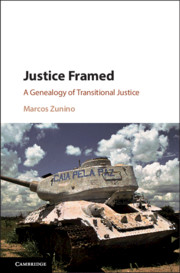Crossref Citations
This Book has been
cited by the following publications. This list is generated based on data provided by Crossref.
2019.
BOOKS RECEIVED.
The Cambridge Law Journal,
Vol. 78,
Issue. 02,
p.
475.
Garnsey, Eliza
2019.
The Justice of Visual Art.
Gonzalez-Ocantos, Ezequiel A.
2019.
The Politics of Transitional Justice in Latin America.
Hassellind, Filip Strandberg
and
Baaz, Mikael
2020.
Just another battleground: resisting courtroom historiography in the extraordinary chambers in the courts of Cambodia.
Journal of Political Power,
Vol. 13,
Issue. 2,
p.
252.
Elston, Cherilyn
2020.
Nunca Invisibles: Insurgent Memory and Self-representation by Female Ex-combatants in Colombia.
Wasafiri,
Vol. 35,
Issue. 4,
p.
70.
Killean, Rachel
2021.
Environmental Restorative Justice in Transitional Settings.
SSRN Electronic Journal,
Killean, Rachel
and
Dempster, Lauren
2021.
Mass Violence, Environmental Harm and the Limits of Transitional Justice.
SSRN Electronic Journal,
Hassellind, Filip Strandberg
2021.
The International Criminal Trial as a Site for Contesting Historical and Political Narratives: The Case of Dominic Ongwen.
Social & Legal Studies,
Vol. 30,
Issue. 5,
p.
790.
Jones, Briony
2021.
The performance and persistence of transitional justice and its ways of knowing atrocity.
Cooperation and Conflict,
Vol. 56,
Issue. 2,
p.
163.
Patrizi, Elena
2021.
Redressing forced removals of Yenish children in Switzerland in the 20th century: An analysis through transitional justice lens.
Childhood,
Vol. 28,
Issue. 4,
p.
540.
Strandberg Hassellind, Filip
2022.
Integrating “storytelling” as a method in judicial processes? The case of Justicia Especial para la Paz.
Oñati Socio-Legal Series,
Vol. 12,
Issue. 4,
p.
843.
Killean, Rachel
2022.
The Palgrave Handbook of Environmental Restorative Justice.
p.
247.
Ouassini, Nabil
2022.
Comparative Criminology Across Western and African Perspectives.
p.
180.
Manning, Peter
Tchilingirian, Jordan
Kum, Somaly
and
Nedelcu, Tudor
2023.
Transitional Justice Networks and the Role of ‘local’ Actors in Cambodia.
Journal of Peacebuilding & Development,
Vol. 18,
Issue. 2,
p.
158.
Melvin, Jess
Wahyuningroem, Sri Lestari
and
Pohlman, Annie
2023.
Resisting Indonesia’s Culture of Impunity: Aceh’s Truth and Reconciliation Commission.
Davidović, Maja
and
Turner, Catherine
2023.
What Counts as Transitional Justice Scholarship? Citational Recognition and Disciplinary Hierarchies in Theory and Practice.
International Studies Quarterly,
Vol. 67,
Issue. 4,
Destrooper, Tine
2023.
“The Truthfulness Lies in the Process, Not the Outcome” Using Artistic Practices to Further Truth-Telling and Memorialization in the Philippines.
Social Sciences,
Vol. 12,
Issue. 9,
p.
516.
Carvajalino, Jinú
and
Davidović, Maja
2023.
Escaping or Reinforcing Hierarchies? Norm Relations in Transitional Justice.
International Studies Review,
Vol. 25,
Issue. 3,
Herremans, Brigitte
and
Destrooper, Tine
2023.
Moving Beyond Formal Truth Practices and Forensic Truth in the Syrian Conflict: How Informal Truth Practices Contribute to Thicker Understandings of Truth.
Social & Legal Studies,
Vol. 32,
Issue. 4,
p.
519.
Destrooper, Tine
2024.
Contextualising the absence of standardised approaches to transitional justice in the Philippines.
International Journal of Law in Context,
p.
1.





